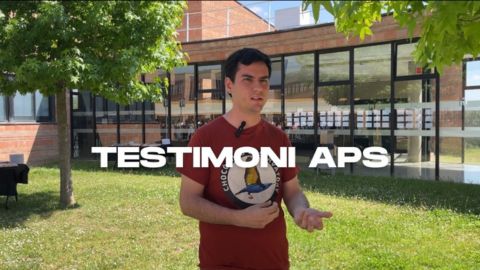Francisco Pablo Salvador presents his undergraduate thesis with Service-Learning on the conservation of sea turtles in Colombia
Francisco Pablo Salvador, a student of the Bachelor's Degree in Environmental Biology at the UAB, presents in an interview his Final Degree Project (TFG) titled "Strategy for the Conservation of Sea Turtles on the Coasts of Chocó (Colombia)", carried out in a Service-Learning (SL) format. In the video, published by the FAS, he explains how the idea came about after completing his curricular internship in that country

Service-Learning Final Degree Projects (SL-FDPs) aim to respond to a real social need, with the intention of contributing to the improvement of the quality of life in the specific territory.
The project, carried out on the coasts of Chocó in Colombia with the support of the local organization Chocó Bird Observatory and supervised by Anna Membrives Soler, was recognized with one of the awards for Final Degree Projects using the Service-Learning methodology. The video features testimonials from both the student and a representative of the organization, who describe the collaborative work process, the lessons learned, and the impact generated in the area.
Francisco Pablo Salvador completed his undergraduate internship on the coasts of Chocó, Colombia, initially aiming to conduct bird banding activities with the organization Chocó Bird Observatory. Once there, he identified that the socioeconomic and educational challenges in the region significantly affected biodiversity conservation. In response to this reality, he decided to focus his Final Degree Project on designing a strategy for the conservation of sea turtles, tailored to local needs and capacities.
The strategy consists of seven videos, in which the author provides all the relevant guidelines and explains the background, the characteristics of sea turtles, offshore handling, patrolling, hatchery construction, actions during nesting, egg relocation, and finally, how to manage hatchlings and data collection.
According to the student, “The lessons I’ve learned throughout this project include, on one hand, learning to coordinate with different people, appreciating everything I have, and valuing nature as it is—nature doesn’t need any additives; it can be enjoyed on its own.”
For her part, Ana Catalina Pinzón, representative of the collaborating organization, highlights the transformative impact of the initiative: I think it’s really interesting that people, students, come to places with such needs like Colombia, and to such a small place like Pangui. It transforms our culture, our future ambitions, and our projection as a society on all levels.
On May 26, the UAB Faculty of Veterinary Medicine hosted the 6th Service-Learning Conference, during which the UAB’s Service-Learning Office presented awards for the best Final Degree Projects in SL format. The awardees shared the social impact of their projects, thus showing how academic initiatives can become useful and necessary tools for social transformation.
In this context, the project by Francisco Pablo Salvador is presented through this video, illustrating how an academic work can contribute to biodiversity conservation in a vulnerable setting. You can access the strategy of the project here.
The UAB, with the Sustainable Development Goals
-
Quality education
-
Life below water
-
Sustainable cities and communities